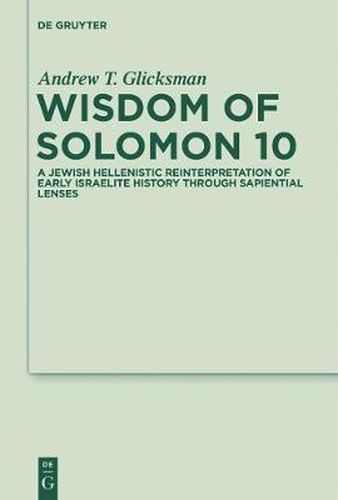Wisdom of Solomon 10: A Jewish Hellenistic Reinterpretation of Early Israelite History through Sapiential Lenses
Andrew T. Glicksman

Wisdom of Solomon 10: A Jewish Hellenistic Reinterpretation of Early Israelite History through Sapiential Lenses
Andrew T. Glicksman
This title is printed to order. This book may have been self-published. If so, we cannot guarantee the quality of the content. In the main most books will have gone through the editing process however some may not. We therefore suggest that you be aware of this before ordering this book. If in doubt check either the author or publisher’s details as we are unable to accept any returns unless they are faulty. Please contact us if you have any questions.
The Wisdom of Solomon 10 is a unique passage among Jewish sapiential texts since it both presents Lady Wisdom as God’s acting agent in early Israelite history and explicitly categorizes key biblical figures as either righteous or unrighteous. Structurally, Wisdom 10 is a pivotal text that binds the two halves of the book together through its vocabulary and themes. Although chapter 10 is such a unique passage that is central to the work, no full-scale study of this chapter has been attempted. Recent scholarship on the Wisdom of Solomon has focused on the identification of genres in the book’s subsections and the author’s reinterpretation of Scripture. Through the use of historical and literary criticism, this study especially focuses on the genre and hermeneutical method of Wisdom 10 in comparison to other passages in the book and similar types of literature inside and outside the Bible. Chapter One establishes the purpose and methodology of the study, Chapter Two sets the literary and historical contexts for the Wisdom of Solomon, and Chapters Three to Six analyze the text poetically, form-critically, exegetically, and hermeneutically. This study concludes that Pseudo-Solomon, the book’s author, composed and used Wisdom 10 in order to bind the two halves of the book together. Its genre is that of a Beispielreihe, or example list, and its form is an alternation of positive and negative examples that are linked by the repetition of a keyword. The passage also reflects elements of aretalogy, synkrisis, and midrash. Because of the first two of these elements, chapter 10 may be seen as supplementing the encomiastic genre in chapters 6-9. Furthermore, the aretalogical flavor of the text depicts Lady Wisdom in ways similar to the popular Hellenistic Egyptian goddess Isis in order to show Wisdom’s superiority to the pagan deity. Lastly, chapter 10 exhibits six primary hermeneutical principles used by the author throughout the book, albeit with differing degrees of focus. Since the Wisdom of Solomon is a late composition, this study illuminates one facet of the Jewish Hellenistic reinterpretation of Scripture and will elucidate similar modes of exegesis in the early rabbinical and early Christian eras.
This item is not currently in-stock. It can be ordered online and is expected to ship in 7-14 days
Our stock data is updated periodically, and availability may change throughout the day for in-demand items. Please call the relevant shop for the most current stock information. Prices are subject to change without notice.
Sign in or become a Readings Member to add this title to a wishlist.


